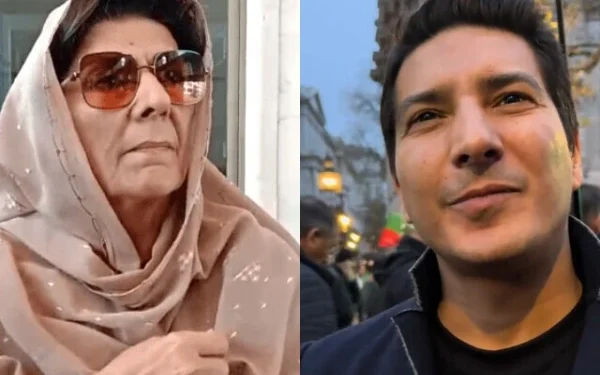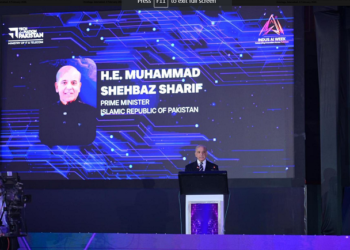The political and legal spotlight once again turned toward the Pakistan Tehreek-e-Insaf (PTI) leadership and their families, as Sher Shah Khan, the son of Aleema Khan—sister of PTI founder and former Prime Minister Imran Khan—was produced in court. His case has drawn widespread attention not only because of his family ties but also due to the sensitive nature of the charges, which are being heard in an Anti-Terrorism Court (ATC).
Court Proceedings Marked by Tension and Media Restrictions
The case of Sher Shah Khan came up for hearing before Judge Manzar Ali Gul at the Anti-Terrorism Court. The session began on a tense note when the judge ordered that all media representatives be removed from the courtroom.
Judge Manzar Ali Gul remarked firmly that no media personnel would be allowed inside during the hearing. Security officials then escorted reporters out of the courtroom. This decision sparked concerns among journalists and observers about the transparency of the proceedings, especially since the case involves a family member of one of Pakistan’s most high-profile political figures.
The judge further instructed that in the future, media personnel must not bring mobile phones into his courtroom. Instead, if they wish to attend, they should only carry “copy and pencil” for note-taking. His strict stance reflected growing judicial concerns about information leaks, potential contempt of court issues, and the politicization of sensitive cases.
Charges and Prosecution’s Position
The prosecution presented a strong case against Sher Shah Khan, asserting that his presence at the alleged crime scene was confirmed through video evidence. According to the state prosecutor, not only was Sher Shah reportedly present during the incident, but a weapon was also used, further aggravating the nature of the allegations.
In addition, the prosecution insisted that Sher Shah’s social media accounts needed to be investigated and recovered, arguing that his online activity may contain material evidence related to the case. On this basis, they requested that Sher Shah be handed over to police custody for a thirty-day physical remand.
This demand highlighted the state’s intent to probe the digital trail left by Sher Shah and possibly establish connections between his alleged presence at the crime scene and any communication or coordination through online platforms.
Defense’s Arguments: Illegal Arrest and Rights Violations
In response, advocate Salman Akram Raja, representing Sher Shah Khan, strongly opposed the prosecution’s request. He argued that the arrest was illegal, pointing out that Sher Shah had been taken into custody 27 months after the alleged incident.
Salman Akram Raja further reminded the court that Sher Shah had appeared in the same courtroom a day earlier with his brother, suggesting that the authorities deliberately chose to arrest him at that time despite his compliance with legal processes. The defense emphasized that such tactics undermined the fairness of the judicial system and violated the fundamental rights of the accused.
By challenging the legality of the arrest, the defense team sought to weaken the prosecution’s position and prevent a lengthy remand period, which they claimed could lead to harassment or coercion of the accused.
Reserved Judgment on Remand Request
After hearing detailed arguments from both sides, Judge Manzar Ali Gul reserved his decision regarding Sher Shah Khan’s remand. This means the ruling—whether Sher Shah will be placed under extended police custody or granted relief—will be announced at a later stage.
The reserved judgment underscores the delicate balance the judiciary must maintain in politically sensitive cases, where legal considerations intertwine with public scrutiny and political narratives.
Background: Who is Sher Shah Khan?
Sher Shah Khan is the second son of Aleema Khan, who is not only the sister of Imran Khan but also a prominent businesswoman and philanthropist. Aleema Khan has often been in the media spotlight herself, particularly regarding her business ventures, charity work, and occasional involvement in PTI’s political affairs.
As Imran Khan’s nephew, Sher Shah’s case carries significant political weight. PTI’s supporters view the legal troubles faced by Imran Khan’s family members as part of a broader strategy to pressure and weaken the party, especially amid the ongoing political turbulence in Pakistan.
Political Context and Implications
The timing of Sher Shah Khan’s arrest is noteworthy. Pakistan’s political climate remains highly charged, with PTI leaders and activists frequently facing arrests, trials, and restrictions. The production of Sher Shah in court is being viewed by many as part of the larger legal and political battle between the state and PTI.
Observers point out that the Anti-Terrorism Court’s involvement indicates the seriousness with which the authorities are pursuing cases linked to PTI leaders and their families. However, critics argue that the frequent use of anti-terrorism laws against political figures risks undermining democratic principles and raises questions about selective application of justice.
Media Freedom and Transparency Concerns
The courtroom incident where journalists were barred has sparked a fresh debate about freedom of the press in Pakistan. Journalists play a critical role in ensuring transparency in high-profile cases, and the sudden order to remove them raised eyebrows across media circles.
Press associations have already voiced concern that restricting access to the proceedings may foster suspicions of political influence over the judiciary. On the other hand, legal experts argue that judges have the authority to restrict access in order to preserve the sanctity of proceedings, especially in sensitive cases involving terrorism-related charges.
Public Reactions
The case has generated intense public interest on social media, where supporters and critics of PTI are engaging in heated debates. PTI loyalists see the arrest as part of a “systematic crackdown” against Imran Khan’s party, while government supporters argue that no one should be above the law, regardless of family background.
Public opinion remains divided, but the incident has once again highlighted how family members of political leaders often become embroiled in Pakistan’s legal and political storms, whether as active participants or as collateral in larger power struggles.
What Happens Next?
The reserved decision on Sher Shah Khan’s remand will be pivotal. If the court grants an extended police remand, it could lead to further investigations into his digital communications and alleged role in the incident, possibly widening the scope of the case. On the other hand, if the court sides with the defense and finds the arrest unlawful, it could bolster PTI’s claims of political victimization.
Legal experts suggest that regardless of the outcome, the case will continue to attract attention given Sher Shah’s family background and the broader political crisis in Pakistan.
Conclusion
The production of Sher Shah Khan, son of Aleema Khan and nephew of PTI founder Imran Khan, in the Anti-Terrorism Court has once again spotlighted the intersection of law, politics, and media freedom in Pakistan. With the court reserving its decision on his remand, the case remains at a crucial juncture.
The unfolding developments will not only determine Sher Shah’s immediate future but also influence broader perceptions of judicial independence, press freedom, and political accountability in the country. For now, all eyes remain on Judge Manzar Ali Gul’s forthcoming ruling, which could shape the next chapter in this high-profile saga.

























